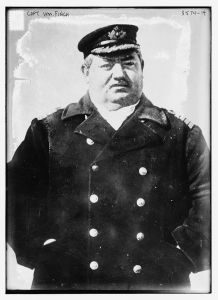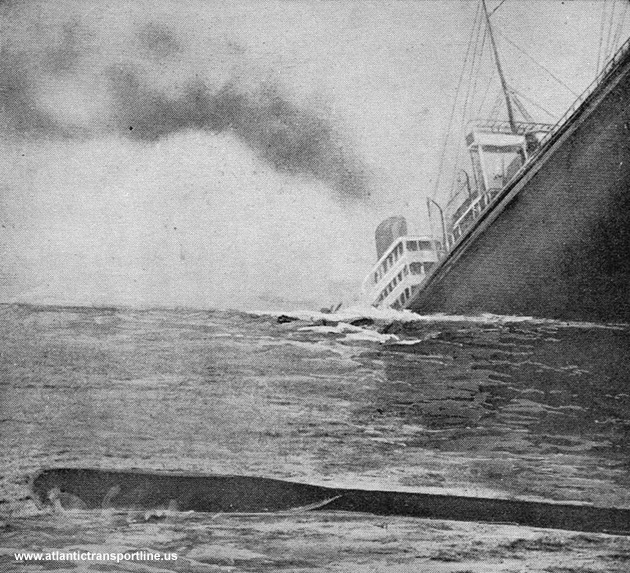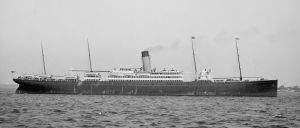The captain was on the bridge of the ship when he saw the track of the torpedo about 300 feet away, but by then it was too late.
Pictured, the SS Arabic sinking (Image: Illustrated London News [London, England]
Captain William Finch was a portly man, but I imagine him moving faster than someone of his build would be expected. I can almost see those jowls quiver as he issued his final commands before the torpedo struck, sending a huge column of water into the air and hurling him into the sea.
Finch was sucked beneath the roiling waves, but he fought for his life and managed to make his way to the surface.
SS Arabic
It was August 19, 1915, and his passenger ship, the SS Arabic, was in its death throes, having been torpedoed without warning by German submarine U-24 just four miles off Ireland’s Cape Clear.
There were 180 passengers – 145 British, 26 Americans and several Spanish, French, Belgians and Russians -- on board, as well as 250 crew, travelling from Liverpool to New York.
Fourteen lifeboats were launched, and all the passengers donned the life jackets that had been placed around the ship’s deck. Finch and his men must have worked very fast because in little over 10 minutes the SS Arabic would be gone, taking 44 lives with her.

Captain William Finch (Image: Library of Congress Prints and Photographs Division Washington, D.C. 20540 USA)
Had it not been for the quick actions of captain and crew, the number of fatalities would have been higher. As William Finch said later about the engineers, who stuck to their posts up to the last moment: ‘They were heroes a thousand times over, who carried out my orders from the bridge, even when they knew the ship was sinking.
‘It was well that this was so, as otherwise the loss of life would have been very large, as the enemy submarine never gave us any warning whatever, and as a matter of fact we never saw her.’
A little over two months earlier, on June 9, the luxury liner RMS Lusitania was struck by a torpedo just a few miles from the Arabiic’s position. It sank with the loss of almost 1,200 lives.
'The enemy submarine never gave us any warning whatever, and as a matter of fact we never saw her.’ -- Captain William Finch
On October 10, 1918, the RMS Leinster would suffer the same fate. A German submarine sank it as it travelled across the Irish Sea to Holyhead. A total of 529 civilian and military passengers were killed that day – the greatest ever loss of life in that stretch of water and the greatest loss of life on an Irish-registered ship.
I’d never heard of the Leinster, much less the Arabic. It is ships like the Lusitania and the Titanic that we commemorate. The loss of life was greater in those tragedies, and in the numbers game that sometimes is history, they qualify as somehow being more significant.
Tell that to the families of those on the Arabic, who felt the weight of their loss almost a hundred years ago to this day.
History can be as unforgiving as the cruel sea. It takes complex, nuanced lives that were filled with passions, secrets, loves and fears, and then consigns them to its dusty depths, leaving only a statistic to be browsed by the mildly curious.
I’ll think of the Arabic in the days ahead. That’s not much as far as commemorations go, but it’s all that’s left.
From historywithatwist.wordpress.com


Claire Fullerton
I, too, will think of the Arabic in the days ahead. Thank you, Mr. Lawlor, for this post.
Aug 16, 2015
David Lawlor
Thank you, Claire.
Aug 17, 2015
Admin
Fran Reddy
Great story to bring to mind the others who may not receive the same recognition. Thanks David.
Aug 19, 2015
David Lawlor
Thanks Fran. Sorry for not replying sooner, I've been out of action for a few days
Aug 22, 2015
Ricky Duffy
Thank you.
Aug 23, 2015
David Lawlor
You're welcome.
Aug 23, 2015
Patrick Murphy
I've recently finished reading Erik Larson's excellent book, Dead Wake, that relates the last voyage of the Lusitania. You are right - certain ship tragedies get all the attention. But as you study history you find there are many, many tales that also deserve to be told. As you say - every family touched by an event like the sinking of the Arabic has suffered a loss. For anyone interested in what that experience may be like, Larson's book effectively humanizes the tragedy of these indiscriminate torpedo sinkings.
Aug 25, 2015
David Lawlor
Thanks Patrick. Larson's book certainly sounds like an interesting read. I'll check it out.
Aug 25, 2015
Patrick Murphy
David, you should. It is a terrific read. If you are not familiar with Larson's work he has a gift for weaving historical facts and evidence into a compelling narrative. History written as mystery. In addition to the humanizing quality of his writing about the Lusitania there is a great deal of intrigue and politics that is exposed. I would say, possibly, some interesting context regarding the protection, and lack of protection, of merchant and passenger vessels at the time and how this served strategic interests - some of which may apply to the story of the Arabic.
Aug 25, 2015
David Lawlor
Sounds just up my street, Patrick. Thanks
Aug 25, 2015
Heritage Partner
That's Just How It Was
Yes , history has a way of only highlighting certain battles or ships lost.
Take the RMS Empress of Ireland for example which collided with the Norwegian SS Storstad in May 1914 on the Saint Lawrence River. The loss of life was somewhere in the region of 1,0 12 people with over 1.400 people on board .
When the Titanic sank 1912 , however it created mass media attention; and still does to this day. Yet the lives of the people on board the RMS Empress of Ireland were just as precious to their loved ones as those on the Titanic.
Now I know that books and films have been written and made about both of this ships ; however – if we asked the ordinary person in the street , do they know anything about the RMS Empress of Ireland- the answer would be ‘no’ I suspect . Yet if we ask the ordinary person do they know anything about the Titanic ; they answer would be I suspect ‘yes ‘ I saw that film . !!!.
Why I wonder ; is this . Is this something for Historians to delve into ??
Sep 30, 2015
David Lawlor
My sentiments exactly. In fact, I wrote a piece on the Empress of Ireland some time ago. History is a numbers game when it comes to so many stories, which is a shame. You might like this one...
https://goo.gl/pB13Dj
Sep 30, 2015
Patrick Murphy
Agreed. I live in Chicago and there was a tragic sinking here 100 years ago, "The Eastland Disaster," that happened literally in the middle of the City on the Chicago River. The ship keeled over at dockside and over 800 people lost their lives, including many entire families. A large number of the passengers were employees heading to a company picnic with their families. Certain city blocks around the company plant were nearly de-populated. Yet many people even in Chicago have never heard of this disaster. Irony: the ship foundered in part because it was top-heavy due to the large number of lifeboats that had been added in the aftermath of the Titanic. https://en.wikipedia.org/wiki/SS_Eastland
Sep 30, 2015
David Lawlor
What an amazng story, Patrick. The Eastland was just 20ft from the dock and yet 800 perished. Incredible.
Oct 2, 2015
Patrick Murphy
Yes, it's an incredible and incredibly sad story. I am a transplant to Chicago so am in endless catch-up mode to build my cultural literacy. So when I first heard about this story I "bought the book." The one I read was: The Sinking Of The Eastland: America's Forgotten Tragedy by Jay Bonansinga. It is a well written account and covers the narrative, historical, cultural, etc. dimensions of the story. A good read.
Oct 2, 2015
David Lawlor
You are the go-to man for ship tragedies, Patrick :)
Oct 2, 2015